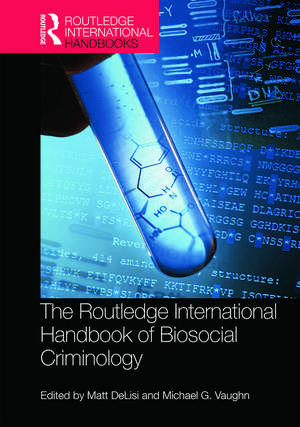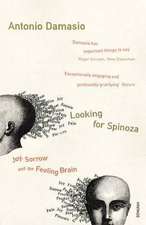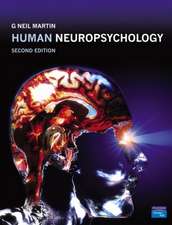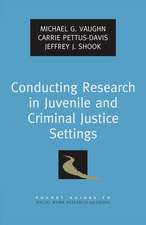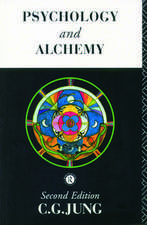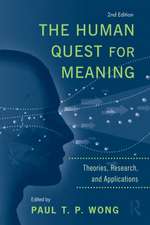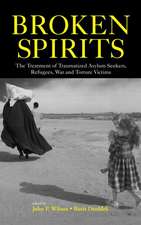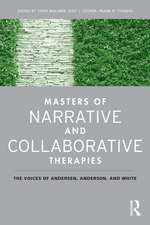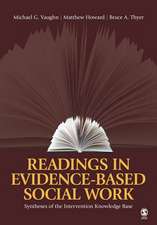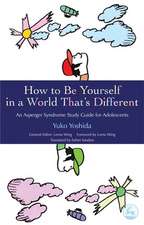The Routledge International Handbook of Biosocial Criminology: Routledge International Handbooks
Editat de Matt Delisi, Michael Vaughnen Limba Engleză Hardback – 23 dec 2014
After decades of almost exclusive sociological focus, criminology has undergone a paradigm shift where the field is more interdisciplinary and this book combines perspectives from criminology and sociology with contributions from fields such as genetics, neuropsychology, and evolutionary psychology. The Routledge International Handbook of Biosocial Criminology is the largest and most comprehensive work of its kind, and is organized into five sections that collectively span the terrain of biosocial research on antisocial behavior.
Bringing together leading experts from around the world, this book considers the criminological, genetic and neuropsychological foundations of offending, as well as the legal and criminal justice applications of biosocial criminological theory. The handbook is essential reading for students, researchers, and practitioners from across the social, behavioural, and natural sciences who are engaged in the study of antisocial behaviour.
| Toate formatele și edițiile | Preț | Express |
|---|---|---|
| Paperback (1) | 491.11 lei 6-8 săpt. | |
| Taylor & Francis – 13 iul 2017 | 491.11 lei 6-8 săpt. | |
| Hardback (1) | 1575.62 lei 6-8 săpt. | |
| Taylor & Francis – 23 dec 2014 | 1575.62 lei 6-8 săpt. |
Din seria Routledge International Handbooks
-
 Preț: 371.78 lei
Preț: 371.78 lei -
 Preț: 375.50 lei
Preț: 375.50 lei -
 Preț: 362.19 lei
Preț: 362.19 lei -
 Preț: 352.08 lei
Preț: 352.08 lei - 9%
 Preț: 1487.70 lei
Preț: 1487.70 lei - 5%
 Preț: 317.31 lei
Preț: 317.31 lei -
 Preț: 372.05 lei
Preț: 372.05 lei -
 Preț: 361.19 lei
Preț: 361.19 lei -
 Preț: 390.13 lei
Preț: 390.13 lei -
 Preț: 311.91 lei
Preț: 311.91 lei - 9%
 Preț: 1488.67 lei
Preț: 1488.67 lei -
 Preț: 390.22 lei
Preț: 390.22 lei -
 Preț: 347.74 lei
Preț: 347.74 lei -
 Preț: 347.74 lei
Preț: 347.74 lei - 9%
 Preț: 1490.11 lei
Preț: 1490.11 lei -
 Preț: 356.22 lei
Preț: 356.22 lei -
 Preț: 348.27 lei
Preț: 348.27 lei - 5%
 Preț: 328.11 lei
Preț: 328.11 lei -
 Preț: 394.24 lei
Preț: 394.24 lei - 8%
 Preț: 392.89 lei
Preț: 392.89 lei - 8%
 Preț: 422.42 lei
Preț: 422.42 lei -
 Preț: 357.22 lei
Preț: 357.22 lei - 8%
 Preț: 421.97 lei
Preț: 421.97 lei - 5%
 Preț: 452.16 lei
Preț: 452.16 lei -
 Preț: 341.55 lei
Preț: 341.55 lei - 9%
 Preț: 1651.61 lei
Preț: 1651.61 lei - 9%
 Preț: 1665.70 lei
Preț: 1665.70 lei -
 Preț: 381.91 lei
Preț: 381.91 lei -
 Preț: 350.20 lei
Preț: 350.20 lei -
 Preț: 347.74 lei
Preț: 347.74 lei - 20%
 Preț: 1401.00 lei
Preț: 1401.00 lei -
 Preț: 342.76 lei
Preț: 342.76 lei -
 Preț: 345.63 lei
Preț: 345.63 lei -
 Preț: 345.16 lei
Preț: 345.16 lei -
 Preț: 353.88 lei
Preț: 353.88 lei -
 Preț: 1057.72 lei
Preț: 1057.72 lei -
 Preț: 348.05 lei
Preț: 348.05 lei - 5%
 Preț: 337.33 lei
Preț: 337.33 lei -
 Preț: 365.90 lei
Preț: 365.90 lei - 9%
 Preț: 1528.86 lei
Preț: 1528.86 lei -
 Preț: 346.77 lei
Preț: 346.77 lei -
 Preț: 392.48 lei
Preț: 392.48 lei - 9%
 Preț: 1454.51 lei
Preț: 1454.51 lei - 5%
 Preț: 326.85 lei
Preț: 326.85 lei -
 Preț: 346.11 lei
Preț: 346.11 lei -
 Preț: 361.74 lei
Preț: 361.74 lei - 9%
 Preț: 1349.74 lei
Preț: 1349.74 lei - 19%
 Preț: 422.81 lei
Preț: 422.81 lei - 8%
 Preț: 385.56 lei
Preț: 385.56 lei
Preț: 1575.62 lei
Preț vechi: 1921.49 lei
-18% Nou
Puncte Express: 2363
Preț estimativ în valută:
301.49€ • 314.78$ • 249.52£
301.49€ • 314.78$ • 249.52£
Carte tipărită la comandă
Livrare economică 04-18 aprilie
Preluare comenzi: 021 569.72.76
Specificații
ISBN-13: 9780415722131
ISBN-10: 0415722136
Pagini: 688
Ilustrații: 48
Dimensiuni: 174 x 246 x 43 mm
Greutate: 1.34 kg
Ediția:1
Editura: Taylor & Francis
Colecția Routledge
Seria Routledge International Handbooks
Locul publicării:Oxford, United Kingdom
ISBN-10: 0415722136
Pagini: 688
Ilustrații: 48
Dimensiuni: 174 x 246 x 43 mm
Greutate: 1.34 kg
Ediția:1
Editura: Taylor & Francis
Colecția Routledge
Seria Routledge International Handbooks
Locul publicării:Oxford, United Kingdom
Public țintă
Postgraduate and UndergraduateCuprins
Part I: Criminological Foundations 1. A Unified Theory of Crime and Delinquency: Foundation for a Biosocial Criminology, Cesar Rebellon, J. C. Barnes, and Robert Agnew 2. Biosocial Criminology as a Paradigm Shift, Anna S. Rudo-Hutt, Jill Portnoy, Frances R. Chen, and Adrian Raine 3. An Evolutionary Perspective on Interpersonal Violence: Sex Differences and Personality Links, Peter K. Jonason 4. Key Findings from Biosocial Research and What They Mean for the Future of Criminology, Kevin M. Beaver and Eric J. Connolly 5. Sociobiology of Lethal Violence in Small-Scale Societies, Ryan M. Ellsworth and Robert S. Walker Part II: Genetic Foundations of Antisocial Behavior 6. Genetics Influences on Antisocial Behavior over the Life Course, Catherine Tuvblad 7. Peer Effects and Molecular Genetics in Adolescent Antisocial Behavior, Tina Kretschmer, Jan Kornelis Dijkstra, and René Veenstra 8. Neurogenetics of Antisocial Behavior, Hayley M. Dorfman and Joshua W. Buckholtz 9. Stress and Antisocial Behavior: The Serotonin System, Jamie C. Vaske and Danielle L. Boisvert 10. When Humans Prey on One Another: Understanding the Biosocial Origins of Victimization, Maria Koeppel, Brian B. Boutwell, and J.C. Barnes 11. Behavioral Genetics and Antisocial Spectrum Disorders, Tracy D. Gunter 12. The Warrior Gene: MAOA Genotype and Antisocial Behavior in Males, Nicholas R. Holland and Matt DeLisi 13. New methods in gene-environment interplay: The extended children of twin design, Qiang Fu Part III: Neurological and Neuropsychological Foundations of Antisocial Behavior 14. Neuroimaging and Antisocial Behavior, Robert A. Schug, Gianni G. Geraci, Gabriel Marmolejo, Heather L. McLernon, Leidy S. Partida, and Alexander J. Roberts 15. Neuropsychology of Psychopathic Traits in Children, Alice P. Jones Bartoli and Guilherme W. Wendt 16. The Psychopharmacology of Criminality and Oxytocin Modulation of Social Behavior in Aggressive Individuals, Royce Lee 17. The Neurobiology of Aggression: Looking Underneath the Hood, C. Nathan DeWall and David S. Chester 18. Why Focusing on Nurture Made and Still Makes Sense: The Biosocial Development of Self-Control, Alexander T. Vazsonyi, Joshua W. Roberts, and Li Huang 19. Brain Abnormalities in Psychopathy, Yaling Yang 20. Self-Reported Head Injuries among Delinquent Youth, Brian E. Perron, Michael G. Vaughn, Joseph Ryan, Christopher Salas-Wright, Mary Ruffolo, and Erick Guerrero 21. Executive Functioning, Reward Processing, and Antisocial Behavior in Adolescent Males, Joanne E. Morgan, Katharine L. Bowen, Simon C. Moore, Justin C. Savage, and Stephanie H.M. van Goozen Part IV: Biosocial Mechanisms of Antisocial Conditions and Antisocial Behavior 22. Temperament as a Biosocial Construct for Understanding Antisocial Behavior, Matt DeLisi and Michael G. Vaughn 23. Why DRD4? An Evolutionary-Informed Model of DRD4 and Antisocial Behavior, Julia Dmitrieva and Emma Espel 24. Biosocial Foundations of Externalizing Behaviors, Lisabeth F. DiLalla and Kyle Bersted 25. The Biological Etiology of Psychopathy, Rheanna J. Remmel and Andrea L. Glenn 26. Development of Aggression and Violence from Infancy to Adulthood: A Biopsychosocial Perspective, Stéphane Paquin, Eric Lacourse, and Isabelle Ouellet-Morin 27. Childhood Maltreatment: An Environmental Pathogen?, Melissa Jonson-Reid and Charlotte Bright 28. Early Dispositional Risks for Conduct Problems and Gene-Environment Interplay, Christopher J. Trentacosta and Benjamin D. Goodlett 29. Blackout: The Traumatic Brain Injury Association with Career Criminality Withstands Powerful Confounds, Monic P. Behnken, Matt DeLisi, Chad R. Trulson, and Michael G. Vaughn 30. Social Stress and the Gene-Environment Influences on Crime and Delinquency, D. Anne Winiarski, Erica L. Smearman, and Patricia A. Brennan 31. Understanding Families from a Biosocial Perspective, John Paul Wright, Jamie Newsome, and Michelle Coyne Part V. Legal and Criminal Justice Applications 32. Intelligence as the quintessential biosocial variable: An examination of etiological factors and associations with criminal offending and criminal justice processing, Joseph L. Nedelec, Joseph A. Schwartz, and Eric J. Connolly 33. Brain Development and Risk Taking During Adolescence: Implications for Prevention of Antisocial Behavior, Daniel Romer and Atika Khurana 34. Offender Rehabilitation from a Maturation/Biosocial Perspective, Michael Rocque and Brandon C. Welsh 35. Antisocial Cognition and Criminal Thinking: Theoretical Interpretations and Biosocial Implications, Glenn D. Walters 36. Sexual Homicide: A Clinical and Investigative Analysis, Stacey L. Shipley and Bruce A. Arrigo 37. Neuroethics of Criminal Responsibility: Mental Disorders Influencing Behavior, Gerben Meynen 38. Alcohol and Drug Misuse as a Biosocial Source of Crime, Christopher P. Salas-Wright and Jelena Todic 39. Empathy, Crime, and Justice, Chad Posick, Michael Rocque, and Matt DeLisi 40. Family Intervention and Their Biosocial Bases, Brandy R. Maynard and Matthew Larson 41. Action-Reaction? Forensic Awareness Analysis and Forensic Awareness in Sexual Homicide, Eric Beauregard and Melissa Martineau 42. Prison as an Environmental Pathogen, Sytske Besemer and Joseph Murray 43. Biosocial Criminology: The Future is Here, Michael G. Vaughn and Matt DeLisi.
Notă biografică
Matt DeLisi is Coordinator of Criminal Justice Studies, Professor in the Department of Sociology, and Affiliate with the Center for the Study of Violence at Iowa State University. Professor DeLisi is Fellow of the Academy of Criminal Justice Sciences, Editor-in-Chief of the Journal of Criminal Justice, and the author of more than 250 scholarly works.
Michael G. Vaughn is Professor in the School of Social Work at Saint Louis University. Professor Vaughn is Fellow of the Society for Social Work and Research and author of more than 250 scholarly works.
Michael G. Vaughn is Professor in the School of Social Work at Saint Louis University. Professor Vaughn is Fellow of the Society for Social Work and Research and author of more than 250 scholarly works.
Recenzii
‘The biosocial revolution has broken through the gates of resistance erected by traditional criminology, offering rich opportunities for transforming the criminological enterprise. For those wishing to join this revolution - or simply to understand it - DeLisi and Vaughn's Handbook is an indispensable resource. The breadth and depth of this volume are impressive; it is a work that should be kept close at hand and consulted regularly.’ - Francis T. Cullen, Distinguished Research Professor, University of Cincinnati, USA
‘Biosocial criminology has expanded by leaps and bounds since its origins and the field continues to evolve. Fortunately for criminologists of all stripes, DeLisi and Vaughn have amassed a who's-who of internationally-acclaimed scholars who are at the forefront of biosocial criminology. The key topics are covered and reviewed well, but more importantly the chapters are filled with nuggets for future theoretical and empirical research that is sure to serve as a model guide for students and academics alike. The editors are to be commended for spearheading a must-have volume that should be on every shelf.’ - Alex R. Piquero, PhD, Ashbel Smith Professor of Criminology, The University of Texas at Dallas, USA
‘This comprehensive Handbook clearly brings out the increasing importance of biosocial research for criminology and criminal justice. Written by leading biosocial scholars, it is very wide-ranging, including not only fundamental research, but also implications for policy and practice. It should be required reading for all criminologists.’ - David P. Farrington, Emeritus Professor of Psychological Criminology, Cambridge University, UK
'The rise of biosocial criminology represents the most important paradigm shift criminology has ever experienced. DeLisi and Vaughn’s book fully captures the scholarly diversity and intellectual excitement that accompany and propel this transition. Readers of DeLisi and Vaughn’s book will not only come away better informed about biosocial criminology, they will come away inspired.’ - John Wright, Professor of Criminal Justice, University of Cincinnati and King Abdullhziz University, Jeddah Saudi Arabia
‘Biosocial criminology has expanded by leaps and bounds since its origins and the field continues to evolve. Fortunately for criminologists of all stripes, DeLisi and Vaughn have amassed a who's-who of internationally-acclaimed scholars who are at the forefront of biosocial criminology. The key topics are covered and reviewed well, but more importantly the chapters are filled with nuggets for future theoretical and empirical research that is sure to serve as a model guide for students and academics alike. The editors are to be commended for spearheading a must-have volume that should be on every shelf.’ - Alex R. Piquero, PhD, Ashbel Smith Professor of Criminology, The University of Texas at Dallas, USA
‘This comprehensive Handbook clearly brings out the increasing importance of biosocial research for criminology and criminal justice. Written by leading biosocial scholars, it is very wide-ranging, including not only fundamental research, but also implications for policy and practice. It should be required reading for all criminologists.’ - David P. Farrington, Emeritus Professor of Psychological Criminology, Cambridge University, UK
'The rise of biosocial criminology represents the most important paradigm shift criminology has ever experienced. DeLisi and Vaughn’s book fully captures the scholarly diversity and intellectual excitement that accompany and propel this transition. Readers of DeLisi and Vaughn’s book will not only come away better informed about biosocial criminology, they will come away inspired.’ - John Wright, Professor of Criminal Justice, University of Cincinnati and King Abdullhziz University, Jeddah Saudi Arabia
Descriere
Bringing together leading experts from around the world, this book considers the criminological, genetic and neuropsychological foundations of offending, as well as the legal and criminal justice applications of biosocial criminological theory. The handbook is essential reading for students, researchers, and practitioners from across the social, behavioural, and natural sciences who are engaged in the study of antisocial behaviour.
